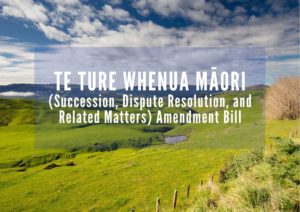
Te Ture Whenua Māori (Succession, Dispute Resolution, and Related Matters) Amendment Bill
- On 22 July 2020 the Te Ture Whenua Māori (Succession, Dispute Resolution, and Related Matters) Amendment Bill (the Bill) had its Third Reading and will shortly be passed into law.
- The Bill intended a “targeted” set of amendments to the Te Ture Whenua Māori Act 1993 (the Act). This approach was in contrast to the repeal and replace approach of the previous Government in its Te Ture Whenua Māori Bill 2016 (which was withdrawn in December 2017).[1]
- In comparison to the Te Ture Whenua Māori Bill 2016 the Bill received considerably less attention and opposition. Opposition speakers at the First and Second Readings did criticise the Government for, in their view, the missed opportunity of a more comprehensive reform of the Act.[2]
- The amendments to the Act include:
New dispute resolution process
- A new formal dispute resolution process will be added to the Act.[3] Recourse to mediation will be voluntary.[4] This dispute resolution process will be available for any matter over which the Māori Land Court has jurisdiction (other than under the Māori Fisheries Act 2004, Māori Commercial Aquaculture Claims Settlement Act 2004, and disputes regarding representation under section 30(1), as these are matters which have existing dispute resolution provisions).[5] The Court will be empowered to formally appoint a mediator and to make orders reflecting the outcome of the mediation.[6] A Judge may serve as mediator, however that Judge may not sit as a Judge in proceedings relating to the issues referred to mediation.[7] Initially, only Māori Land Court Judges will serve as mediators with the Chief Executive of the Ministry of Justice to be required to compile a list of other mediators in the future.[8]
Power of Registrar to determine simple and uncontested applications and without a hearing
- The Act will be amended to permit Māori Land Court Registrars to deal with “simple and uncontested” succession applications without a hearing.[9]
Whāngai
- Where there are succession applications (or claims under the Family Protection Act 1955) relating to Māori freehold land which depend on there being a relationship of descent, it will now be the “tikanga of the relevant iwi or hapū” (rather than the more general, “tikanga Māori” currently in the Act) that will be considered and which will determine whether there is a relationship of descent between the child and the child’s birth or whāngai parents.[10]
Rights of surviving spouse, civil union partner or de facto part of beneficial owner of Māori freehold land
- Owners of a beneficial interest in Māori freehold land will now have the ability to leave that interest by will but subject to the gift of certain specified rights to the deceased owner’s spouse, civil union partner, or de facto partner.[11] These rights are the right to occupy the principal family home if it is on the land and the right to receive any income or discretionary grants from the interest.[12] The rights may be time limited by the will and cannot be transferred or disposed by the surviving spouse or partner.[13] Surviving spouses, civil union partners or de facto partners will receive the above rights if the owner of a beneficial interest in Māori freehold land dies intestate.[14]
- This change is intended to provide descendants of the deceased to succeed to interests, and exercise rights of ownership, such as involvement in decision-making, while preserving certain rights for surviving spouses, civil union or de facto partners.
Landlocked land
- A number of amendments to the access to landlocked land provisions will be made with the intention of providing improved access to landlocked Māori land including:
- amending the defined term “reasonable access”;[15]
- increasing the factors the Court must have regard to when considering applications for reasonable access to landlocked
land to include:[16]- the relationship that the applicant has with the land and with any water site, sacred site, place or cultural or traditional significance or other taonga associated with the land;
- the culture and traditions of the applicant with respect to the land; and
- limiting any consideration of the state of access to the land that existed when the applicant acquired the land to only situations where the land was purchased;
- all appeals of decisions under the landlocked land provisions will be to the Māori Appellate Court (currently appeals in relation to orders that affect General land are to the High Court).
Alienation of Māori land: Right of first refusal for sale or gift of Māori freehold land
- Under section 147 of the Act an owner of Māori freehold land seeking to alienate by sale or gift must give the right of first refusal to the preferred classes of alienees. The rules governing the procedure are contained in the Māori Land Court Rules 2011. The Act will be amended to prescribe the requirements rights of first refusal.[17]
Jurisdiction in respect of injunctions
- Currently the Court’s powers of injunction are limited to stopping or restricting an activity, not compelling an action.[18] The Court will now have the ability to require any person to remove or reinstate structures on, or restore or remedy any damage done to, Māori land, Māori reservations or General Land owned by Māori.[19]
Other changes
Grounds for removal of a trustee, member of the committee of management of a Māori incorporation
- Under section 240 of the Act the limited grounds for removal of a trustee are:
- that the trustee has failed to carry out the duties of a trustee satisfactorily; or
- because of lack of competence or prolonged absence, the trustee is or will be incapable of carrying out those duties satisfactorily.
- The Act will be amended to provide further grounds that disqualify a person from being a trustee or allow for their removal.[20] These grounds are similar to the Trusts Act 2019.[21] Eligibility provisions for members of committees of management of a Māori incorporation have also been updated.[22]
Use and occupation of whenua
- Currently, the beneficiaries of a whānau trust are not eligible to apply to the Māori Land Court for an occupation order.[23] The Act will be amended to allow the Court to now make an occupation order in favour of a beneficiary of a whānau trust that holds a beneficial interest in land.[24]
- Currently, trustees of Māori Reservations may, with the permission of the Court, grant leases and occupations licenses for a period of no more than 14 years (including any terms of renewal).[25] The Act is to now provide for trustees to be able to grant leases and occupation licenses for certain purposes for a period exceeding 14 years. These purposes are education, health and papakāinga housing. [26]
Creation of Māori reservations
- Currently the Chief Executive of Te Puni Kōkiri creates Māori Reservations by Gazette notice on the Court’s recommendation.[27] The Court will now be able to make an order to create a Māori reservation itself.[28] Similarly, the Court (instead of making recommendations to the chief executive) may now exclude land from, or cancel, a Māori reservation or redefine the purposes or beneficiaries of the reservation.[29]
Operation of the Māori Land Court
- Amendments to the Act intended to improve the way the Māori Land Court functions include:
[1] Te Ture Whenua Maori (Succession, Dispute Resolution, and Related Matters) Amendment Bill — First Reading 15 October 2019 https://www.parliament.nz/en/pb/hansard-debates/rhr/combined/HansDeb_20191015_20191015_12 see also https://www.beehive.govt.nz/release/whenua-law-changes-help-wh%C4%81nau
[2] First Reading: https://www.parliament.nz/en/pb/hansard-debates/rhr/combined/HansDeb_20191015_20191015_12 see Hon Nicky Wagner, Matt King; Second Reading: https://www.parliament.nz/en/pb/hansard-debates/rhr/combined/HansDeb_20200624_20200626_12 see Joanne Hayes, Hon Nicky Wagner.
[3] New Part 3A.
[4] New section 98J.
[5] New section 98H.
[6] New sections 98L and 98S.
[7] New section 98N.
[8] New section 98M(2)-(5).
[9] New section 113A.
[10] New section 114A.
[11] New section 108A.
[12] New section 108A(2)
[13] New section 108A(3).
[14] New section 109AA.
[15] Section 326A.
[16] Section 326A(4)(a) and new section 326(4)(da), (db).
[17] New section 147(2)-(7).
[18] Section 19.
[19] New section 19(1)(ba).
[20] Section 240.
[21] See Trust Act 2019, section 105.
[22] Section 240.
[23] Section 328.
[24] Section 328(1)(c).
[25] Section 338(12).
[26] Section 338(14).
[27] Section 338.
[28] Section 338.
[29] Section 338(5).
[30] New section 32A.
[31] New section 40A.
[32] New section 24C.




